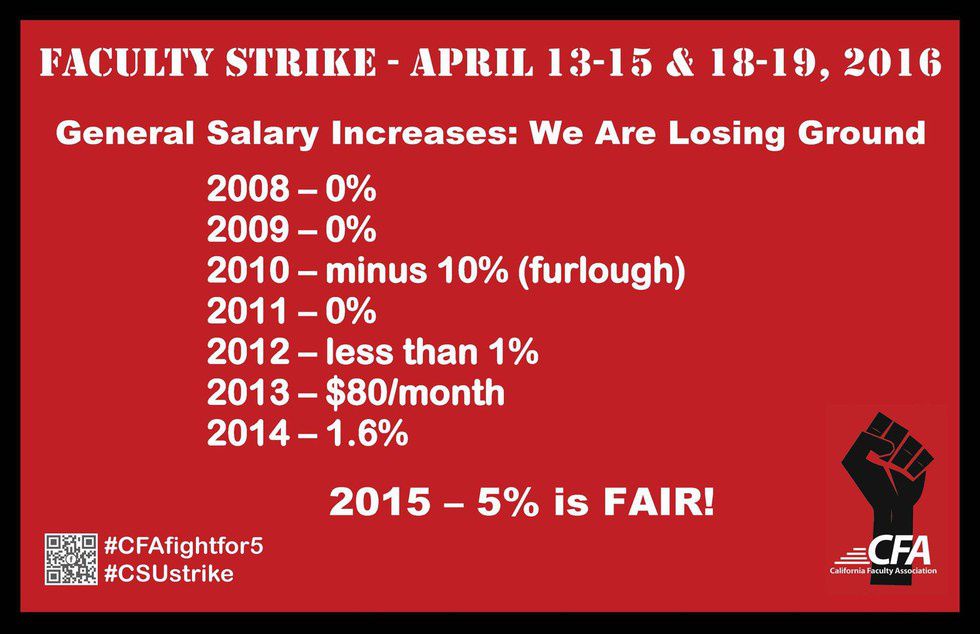The California Faculty Association (CFA) announced it will hold a five-day strike in April at all 23 California State University (CSU) campuses if their demand for a 5 percent increase in salary has not been reached.
The union that represents over 22,000 CSU faculty members throughout the state agreed that unless administration can meet their proposal, they will form a picket line from April 13 through April 15, and on April 18 and April 19.
Members of the CFA have voted in favor of the strike, and over 80 percent of faculty have agreed to participate in this action. If this proposed strike occurs, it would be the largest strike in public higher education in the United States.
In response to the union, Chancellor White and the Board of Directors have proposed a 2 percent increase in salary, as opposed to the CFA’s desired 5 percent. CFA members rejected the offer, and argued that 2 percent of the average faculty salary of $40,000 is not sufficient. The negotiation between administration and the CFA has been stagnant.
The CFA has fought for quality education and expanded access to higher education and affordability for several years. Their motives lie in their belief that faculty working conditions correlate with student learning conditions.
“There is a direct relationship between faculty working conditions and student learning conditions," said San Francisco State University English Composition professor Georgia Gero, who has taught at the CSU for 12 years. "I teach nine courses an academic year because I have to, not because I want to, just to stand a shot at meeting my monthly bills. It’s not sustainable. It impacts the quality of teaching, as well as the time it takes me to get papers back to students. It’s like administration is banking on the fact that faculty cares so much about students that they will allow themselves to be exploited."
The current salary for bay area faculty members is a pressing issue for faculty and students, due to the expensive living situation. Many professors have been forced to leave the CSU altogether because of low pay, which in turn would cause increased class sizes, increased student to teacher ratio and would impact the classes offered to students.
CFA members have already taken action toward informing students of the looming strike at several chapters. CSU East Bay was visited by Chancellor White on Monday afternoon for an open question forum, and was met with hostile remarks from faculty and students regarding the low pay. Meanwhile, at SF State, CFA members held a silent vigil and adorned themselves in masks to represent the death of public education.
SF State President Les Wong sent a mass email that reached the campus community on Wednesday, and emphasized that, in the event of a strike, “classroom time cannot and should not be used by faculty to discuss issues related to the strike.”
SF State Chapter’s President Sheila Tully challenged Wong’s attempt to limit freedom of speech and academic freedom of CSU faculty in a response email: “As educators, we have every right – and indeed obligation – to answer students’ questions and facilitate discussions of issues affecting their education.”
In addition to their support from faculty, staff and students, the CFA gained the CA Democratic Party’s vote to endorse their Fight for Five at the 2016 California Democratic Convention on Feb. 28. In CFA President Jennifer Eagan’s address to the 3,200 delegates, she stated that the Fight for Five is “not just for faculty or for the students. It’s a fight that represents our democratic values, the values of economic justice and social mobility. It’s a fight for a better state...”
The CFA stands for the principle that students cannot be put first if teachers are put last. Not only are students directly affected by the faculty’s low compensation, but they are soon to face an increase in tuition yearly and indefinitely, a decision to be approved by the Board of Trustees. These current issues are addressed by Students for Quality Education (SQE), a student organization with chapters at all CSU campuses whose mission is to provide higher education to all Californians.
CFA member and Communication professor at SF State Bill Bray said, “Get involved, because the more convinced the Board of Trustees are that we’re actually going to follow through with this, the more likely they are to meet us and negotiate in good faith.”






















